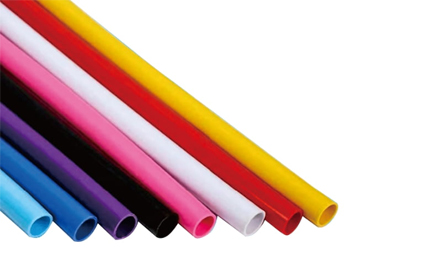In today’s world of agriculture, efficient water management is more essential than ever. As the demand for food grows and climate conditions become increasingly unpredictable, farmers need reliable, cost-effective irrigation systems to support sustainable and productive farming practices. PVC (Polyvinyl Chloride) pipes have emerged as an indispensable component of modern irrigation systems, providing robust solutions that help enhance crop yields, maximize water efficiency, and reduce long-term costs.

Why PVC Pipes Are Ideal for Irrigation
PVC Pipes have several qualities that make them a preferred choice for agricultural irrigation systems:
Durability and Strength
PVC Pipes are highly resistant to environmental stressors, including UV rays, chemicals, and temperature fluctuations. They can withstand harsh outdoor conditions, making them ideal for long-term use in agriculture where exposure to the elements is common. Their structural integrity ensures they are less likely to crack or corrode over time, reducing the need for frequent replacements.
Corrosion Resistance
Unlike metal pipes, Pvc Pipes are not susceptible to corrosion, even when exposed to water and fertilizer solutions for extended periods. This property is particularly important in irrigation systems, where continuous water flow can cause metal pipes to rust or degrade, potentially contaminating the water and damaging crops.
Lightweight and Easy to Install
PVC pipes are lightweight, making them easier and faster to transport and install on farms compared to other materials. This ease of installation is crucial for large-scale agricultural operations, where time and efficiency can significantly impact productivity.
Enhancing Water Efficiency with PVC Pipes
In agriculture, water conservation is key to sustainable operations, particularly in areas prone to drought or limited water resources. PVC pipes support water efficiency in several ways:
Reduced Water Leakage
PVC pipes have tight seals that minimize water leakage, a common issue with older metal or clay pipes. Even small leaks can lead to significant water loss over time, which impacts both resource conservation and operating costs. The reliable joint connections in PVC systems ensure that water is directed precisely where it’s needed, reducing waste and conserving valuable resources.
Improved Flow Rates
PVC pipes offer smooth internal surfaces, which reduce friction and allow water to flow more freely compared to rougher materials. This efficiency helps maintain consistent pressure throughout the irrigation system, ensuring even water distribution across crops. Improved flow rates mean water reaches plants faster and more effectively, supporting healthier growth and reducing the energy required for pumping.
Supporting Drip and Micro-Irrigation Techniques
PVC pipes are highly compatible with modern irrigation methods such as drip and micro-irrigation, which are designed to apply water directly to the root zones of plants. These methods help conserve water by delivering precise amounts needed by the plants, reducing runoff and evaporation. PVC’s adaptability and ease of integration with various irrigation components make it an ideal material for systems focused on conserving water while maximizing crop yield.
Boosting Crop Yields with Efficient PVC Irrigation Systems
Efficient water management directly impacts crop health and yield, and PVC pipes play a crucial role in delivering the right amount of water to plants at the right time. Here’s how:
Consistent Moisture Levels
With PVC-based irrigation systems, farmers can maintain consistent soil moisture, a vital factor in promoting plant health and development. By delivering water uniformly across fields, PVC pipes help prevent water stress on plants, which can lead to wilting, poor growth, and reduced yield.
Enhanced Nutrient Absorption
The precise water delivery enabled by PVC irrigation systems ensures that fertilizers and nutrients applied through irrigation are more effectively absorbed by plants. With less water lost to leaks or runoff, plants can take full advantage of the nutrients, leading to healthier growth and better yields.
Reduced Soil Erosion and Weed Growth
Using PVC pipes for targeted irrigation methods like drip irrigation helps avoid over-saturation and runoff, which can cause soil erosion. By delivering water directly to plant roots, these systems also minimize water exposure to surrounding soil areas, reducing weed growth that could otherwise compete with crops for resources.
Long-Term Cost Savings for Farmers
While the initial investment in PVC pipes may be slightly higher than alternatives, the long-term cost benefits of PVC irrigation systems are significant. Due to their durability, minimal maintenance needs, and low risk of leaks or corrosion, PVC pipes reduce repair and replacement costs. Additionally, improved water efficiency translates to lower water and energy bills, providing further savings for farmers.
Environmental Benefits of Using PVC Pipes in Irrigation
PVC irrigation systems align with sustainable agricultural practices. The efficient water use supported by PVC pipes helps preserve local water sources, making it an eco-friendly choice for environmentally conscious farmers. Moreover, the material itself is recyclable, which contributes to reducing waste when pipes eventually need replacement.
In modern agriculture, PVC pipes have become an essential tool for effective and sustainable irrigation. With their durability, corrosion resistance, ease of installation, and ability to support water-efficient practices, PVC pipes are helping farmers worldwide meet the growing demands of food production while conserving valuable water resources. By enabling precise water delivery and reducing waste, PVC-based irrigation systems not only boost crop yields and enhance productivity but also contribute to a more sustainable and environmentally responsible approach to farming.




 English
English

